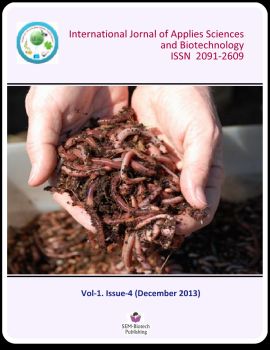Mitigation of the Adverse Effects of Salt Stress on Maize (Zea Mays L.) Through Organic Amendments
DOI:
https://doi.org/10.3126/ijasbt.v1i4.9128Keywords:
Salt stress, organic amendments, farmyard manure, poultry manure, maizeAbstract
Salinity is a major limiting factor for crop production in coastal areas of Bangladesh. Organic amendments could contribute to the improvement of crop production in coastal areas. Two maize cultivars (BARI Hybrid Maize-5 and Hybrid Maize Pacific-987) were grown in pots to investigate the mitigating adverse effects of salt stress in maize by organic amendments. Two doses of farmyard manure (FYM) and poultry manure (PM) were mixed with soils before seed sowing. Plants were subjected to salinity (0-50 mM NaCl) at vegetative stage. Salt stress caused a significant reduction in growth and yield of both maize cultivars. Higher NaCl (50 mM) stress caused a drastic decrease in growth and yield of both maize cultivars. Salinity also decreased reproductive growth, chlorophyll contents and K+/Na+ ratio in both maize cultivars. Organic amendments with FYM and PM improved salt tolerances of maize that were associated with increased yield components, chlorophyll content and K+/Na+ ratio. Hybrid Maize Pacific-987 grown in low salinity with FYM or PM amendments produced higher yield than control condition. On the contrary, BARI Hybrid Maize-5 conferred tolerance to high salinity, when soils were amended with FYM or PM. Furthermore, organic amendments improved electrical conductivity, exchangeable Na and organic matter status under salinity condition. The present study suggests that organic amendments with FYM or PM confer tolerance to salinity in maize by increasing chlorophyll content and K+/Na+ ratio.
DOI: http://dx.doi.org/10.3126/ijasbt.v1i4.9128
Int J Appl Sci Biotechnol, Vol. 1(4): 233-239




